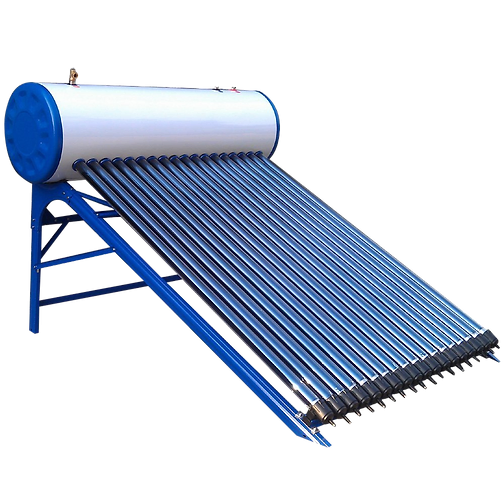Solar Water Heater
Bright Solutions solar water heater is the most competitive alternative to conventional water heating methods such as electric geysers and fuel-fed boilers. It makes an attractive and sustainable option with its pollution free nature and near zero operational cost. Solar water heaters run on a free fuel (i.e. sunshine), thus saving on energy costs that help recover its initial cost in just 2-4 years.
1) Domestic : Flats, Bungalows and Apartments.
2) Commercial : Hotels, Hospitals, Hostels and Dormitories.
3) Industrial : Process Industries, Preheating boiler feed water. In domestic sector, hot water is used for bathing, washing of clothes & utensils etc. The requirement may, however, vary with the season of the year & number of family members.
A solar water heater is a renewable energy technology that utilizes sunlight to heat water for residential, commercial, or industrial purposes. This environmentally friendly system consists of solar collectors or panels and a water storage tank.
Here’s how a typical solar water heater works:
Solar Collectors/ Panels: These are installed on the roof or another suitable location with maximum sunlight exposure. The collectors are designed to absorb sunlight and convert it into heat.
Absorption of Sunlight: The solar collectors are typically made of materials with high thermal conductivity, such as metal or glass, which absorb sunlight and convert it into heat. In the case of flat-plate collectors, a dark-colored absorber plate captures the sunlight.
Transfer of Heat to Water: A fluid (usually a mixture of water and antifreeze) circulates through the collectors, absorbing the heat. This heated fluid is then circulated through pipes or tubes in the water storage tank.
Heat Exchanger: Within the water storage tank, a heat exchanger transfers the heat from the fluid to the domestic water supply. As the fluid releases its heat, it cools down and returns to the solar collectors to be reheated.
Storage Tank: The water storage tank is well-insulated to retain the heat and ensure a constant supply of hot water. It is connected to the existing water heating system to supplement or replace traditional heating methods.
Advantages of Solar Water Heaters:
Renewable Energy Source: Solar water heaters rely on sunlight, a virtually limitless and renewable resource.
Energy Cost Savings: By harnessing solar energy, users can significantly reduce their electricity or gas bills for water heating.
Environmentally Friendly: Solar water heaters produce minimal greenhouse gas emissions compared to conventional water heating methods.
Low Operating Costs: Once installed, solar water heaters generally have low maintenance costs.
Solar water heaters are an efficient and eco-friendly alternative to traditional water heating systems, contributing to both cost savings and environmental sustainability.



